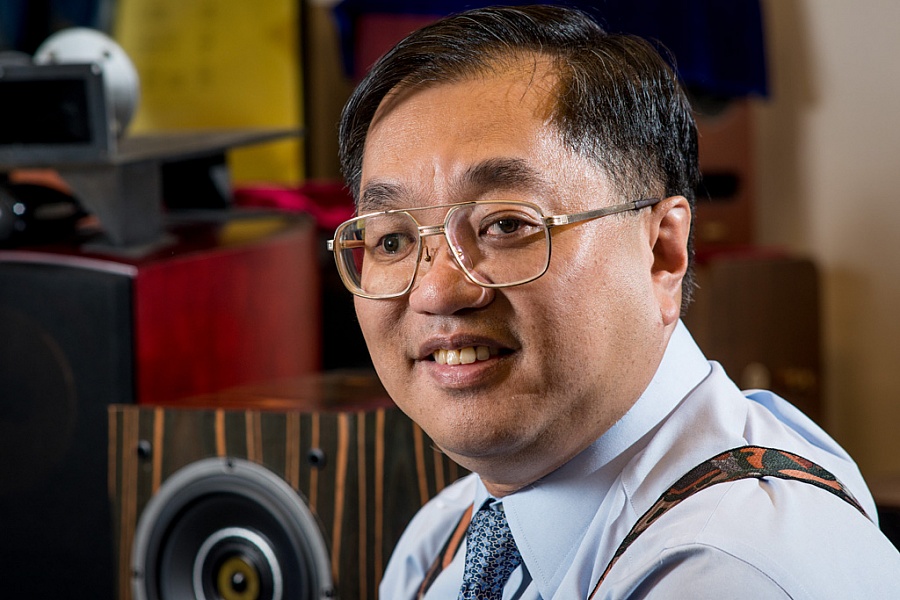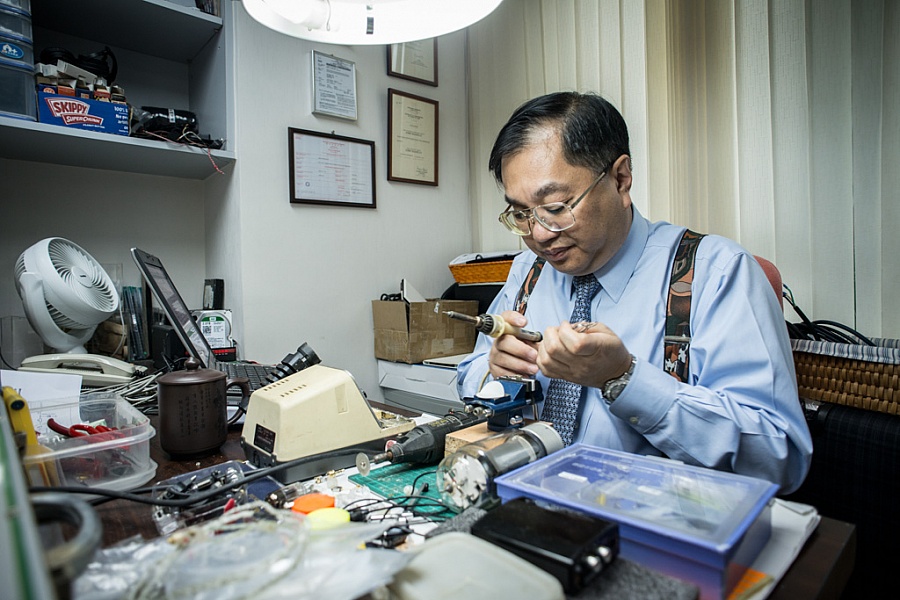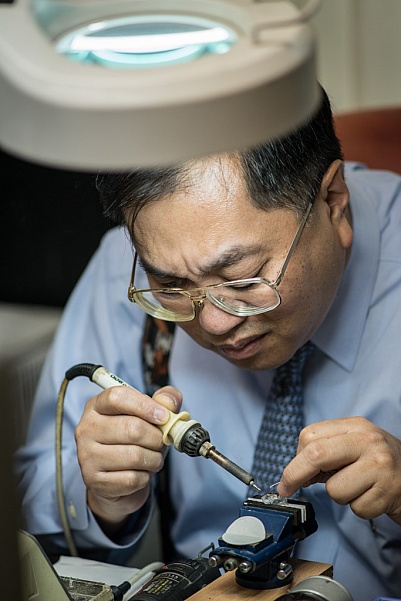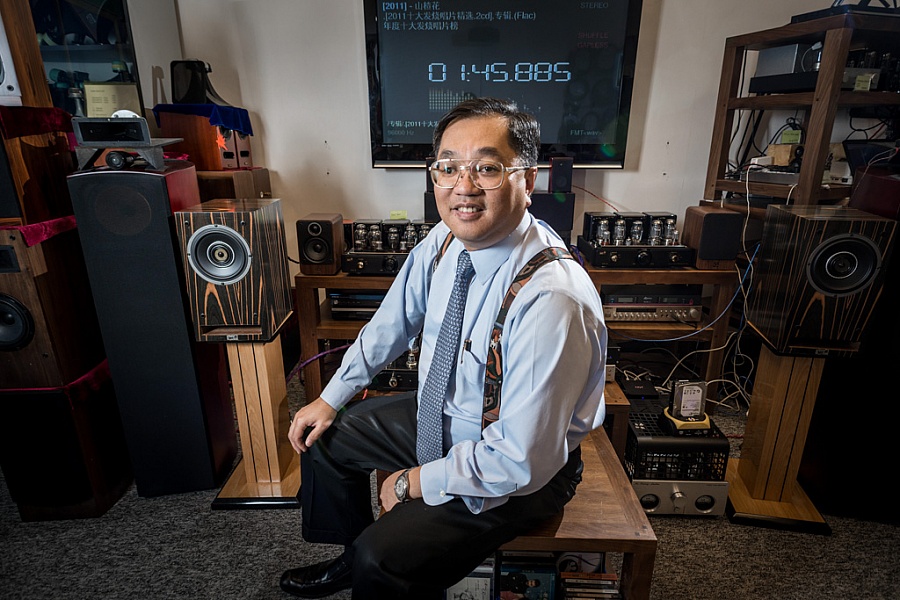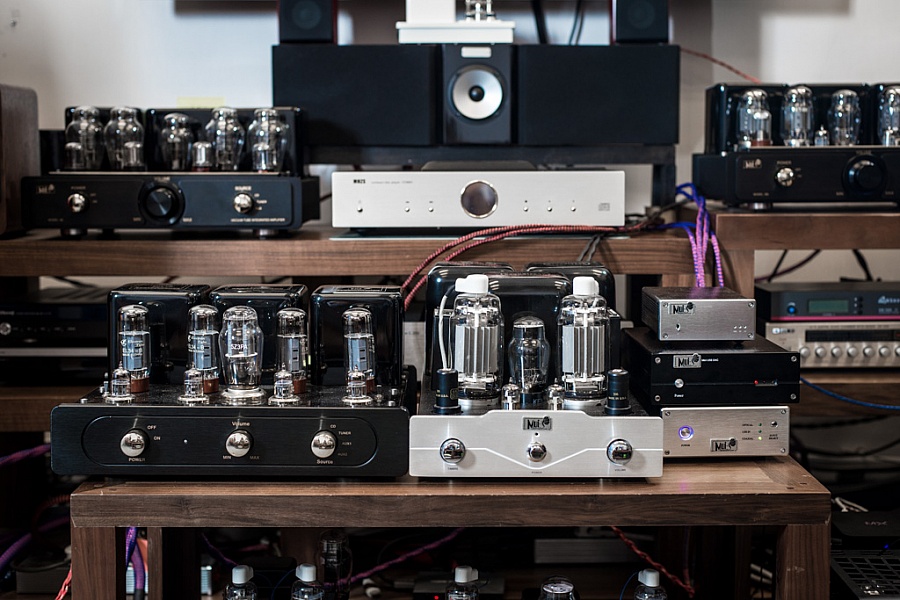Uncle Mui is a self-started, lifelong inventor. He’s enjoyed building electronic items for day to day use from whatever materials are available to him ever since he’s a child. His connection to what’s relevant to the common man probably explains why he’s also a man of much popular culture savvy. When Chloe and I visited his hi-fi store recently, he gave us the chance to experience for real that entrancing scene in the cult film Infernal Affairs when Tony Leung and Andy Lau shared a moment of musical reverie before they commenced their duel as moles in each other’s camp. Taking over from the movie’s protagonists, the two of us indulged in a perfect rendition of Tsai Chin’s The Forgotten Times from an expensive hi-fi system that Uncle Mui crafted himself.
Uncle Mui, or Tony Mui, is the father of Sarah, the Urban Diary designer. The 57-year-old started his own audio business nearly two years ago after he retired from over 25 years of working for companies that sell electrical components, initially as a business negotiator and later as a design engineer.
The end of one long career represents the start of an exciting new phase of life for Uncle Mui as he can now dedicate full-time to his childhood interest of inventing electronics for entertainment, even if that means forsaking the orthodox comforts of retirement for the inevitable pressures involved in starting a business. Any stress that he may face is more than compensated by his sheer enthusiasm, however, as the evergreen engineer can easily give anyone a 90-minute lecture on subjects ranging from the nuts and bolts of an audio system to how one can successfully build a new business.
Uncle Mui grew up on Wing Lee Street in Central. He recalled that when he’s a primary school student, he spent a great deal of time hanging out at the home of one of his classmate’s because that’s the most entertaining place to be when he’s out of a uniform. At that time, his classmate’s brother was training to become an electrical engineer, so whenever he visited his friend, he would see electrical components lying around the flat. This was how he started to get interested in creating small electrical devices for fun.
It was also from his classmate’s brother that he got to know about the local mecca for electronics buffs – Ap Liu Street in Shum Shui Po. Following the instructions carefully from his fellow inventor, he took the ferry from Central to the old Shum Shui Po pier. Ap Liu Street was already well-known among DIY engineers in the sixties as the place to go to for both the most ancient and the most advanced technology of the time. The more or less neatly lined, if cluttered, street stalls that we see today didn’t exist back then, as sellers would lay out all their wares on the ground for public scrutiny. Most of the items found here were actually duds from factories in China. These components were very cheap even by the standards of the time, so people like Uncle Mui would buy plenty of them and invent their own electrical devices.
Uncle Mui created a range of electronic items based on what he learnt from DIY manuals that he devoured in bookshops and libraries plus advice he received from his classmate’s brother. Among the gadgets that he made as toys, one of the most popular was a radio device that could be discreetly hidden inside a metal pencil box. It was so popular that the whole class asked him to make one for everybody so they could kill their boredom during lessons. That’s Uncle Mui’s first successful business venture. Later at Christmas time, he would be doing lighting decorations for his friends.
He went on to study at the Hong Kong Polytechnic, before starting a career that would span over a quarter of a century in the field of electrical components.
Looking back, the role of Ap Liu Street has changed from providing extremely affordable electrical components in the past to selling electrical products and accessories at very cheap prices these days. Now most people go there to buy accessories and to get updated on the latest electrical product trends instead of sourcing for components. Uncle Mui said that even though Ap Liu Street is no longer the grand bazaar of cheap electrical components that it once was, it’s still a place where self-trained engineers can build up their knowledge as well networks, as people would approach you if you know enough and business deals are very often struck after random conversations.
Uncle Mui feels that inspiring places like the Ap Liu Street of his childhood are becoming a thing of the past. Nowadays, all electrical items are made in mainland China, and all one needs to do is to provide a manufacturer with drawings, and they’ll build anything to order. Personal testing becomes irrelevant in this process, and with that goes the satisfaction of testing out different components and refining designs through constant creation of new products. As Uncle Mui said, copying and mass production are always quicker than inventing, and creative, individual enterprise will only suffer for that.
Just before the end of our interview, we asked Uncle Mui to play us Tsai Chin’s spell-binding number one more time. Sitting on his comfortable couch, the music simply sent me afloat, and I know this is a moment that can only be achieved with Uncle Mui’s lifelong experience, innovation and dedication.
Q: What do you like the most about Hong Kong?
A: I like Hong Kong for it’s a very small and efficient city. It’s easy and convenient to meet friends and we all share the same language. Everything is direct, efficient and fast. Other cities around the world are simply too slow.
Q: What do you dislike the most about Hong Kong?
A: I dislike Hong Kong’s poor air quality and environmental hygiene. Look at Singapore!
Q: What does Hong Kong need to do for it to be sustainable?
A: Hong Kong has to develop its own high-quality and high value-added tertiary industry. Even if everyone wants to make the maximum amount of money, you still have to be ethical. At the same time, the Hong Kong government should diversify the city and its economy. For example, if the whole of Canton Road is only selling luxury goods which mainland Chinese tourists are very fond of, what would happen to the streetscape if the Chinese economy collapses one day? Will the whole street turn empty? The government needs a long term vision for the city.
And have we already run out of milk powder for babies? The government can ensure better supply and coordination between suppliers, distributors and outlets.
Also, if the Hong Kong property market is monopolized by the largest property developers in town, then the government should ask the smaller developers to build.
The MTRC refuses to build railway lines which don’t give them high investment returns but at the same time, they refuse to channel the profits they make from property development into the construction and operation of the railway. Then ask another company to run the railway. When the government does little to solve these pressing social issues, why would our future generations want to stay in Hong Kong? If our future generations do not want to stay here, then how can our city be sustainable in the long run?
